Reading 4导读单
Unit 4 Reading 阅读课件 -译林版(2024)英语七年级上册

School life at Sunshine Middle School
introduction&feeling
1 2 3 4 5
6 7
ending&hope
exercises
famous writers living things
nature activities
field trip
School life at Sunshine Middle School
...
...
What subject is it?
Geography / dʒiˈɒɡrəfi /
...
...
What subject is it?
Physics / ˈfɪzɪks /
...
...
What subject is it?
Chemistry / ˈkemɪstri /
...
...
Let’s read the subjects together.
1. What kind of article is it? A. a story
√B. an email C. a letter D. a poem
2. What is this article about?
Opening Introduction of the topic
What subjects are they?
Maths Chinese
Biology English
Geography History
What subject is it? Biology
/ baɪˈɒlədʒi /
...
...
What subject is it? Politics
人教高中英语必修4Unit4 Reading(共26张PPT)
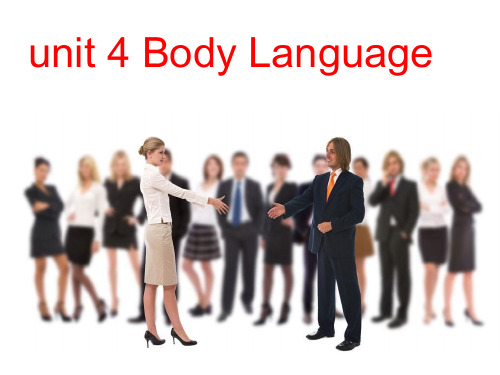
The first mistake
Mr. Garcia from Columbia
Julia Smith
from __B_r_it_a_i_n___
He approaches Ms Smith by_to_u__c_h_i_n_g h_e_r__ s_h_o__u_ld__e_r__ and _k_i_s_s_e_d her on the _c_h_e_e_k____.
奋斗的路上,时间总是过得很快,目前的困难和麻烦是很多,但是只要不忘初心,脚踏实地一步一步的朝着目标前进,最后的结局交给时间 来定夺。 天气影响身体,身体决定思想,思想左右心情。 在所阅读的书本中找出可以把自己引到深处的东西,把其他一切统统抛掉,就是抛掉使头脑负担过重和会把自己诱离要点的一切。 努力向上的开拓,才使弯曲的竹鞭化作了笔直的毛竹。 痛不痛只有自己知道,变没变只有自己才懂。不要问我过得好不好,死不了就还好。 不可压倒一切,但你也不能被一切压倒。 现实的压力压的我们喘不过气也压的我们走向成功。 我不去想是否能够成功,既然选了远方,便只顾风雨兼程。 不要因为众生的愚疑,而带来了自己的烦恼。不要因为众生的无知,而痛苦了你自己。 让珊瑚远离惊涛骇浪的侵蚀吗?那无异是将它们的美丽葬送。 经验是由痛苦中粹取出来的。 人,最大的敌人是自己。 我为你今天的表现感到骄傲。 无所求则无所获。 自然界没有风风雨雨,大地就不会春华秋实。 只要你确信自己正确就去做。做了有人说不好,不做还是有人说不好,不要逃避批判。
She __s_ta__n_d_s_ _b__a_c_k___ appearing _s_u_r_p_r_is_e_d___ and put up her hands as if __i_n__d_e_f_e_n_s_e_____.
牛津阅读树4级(30本)目录
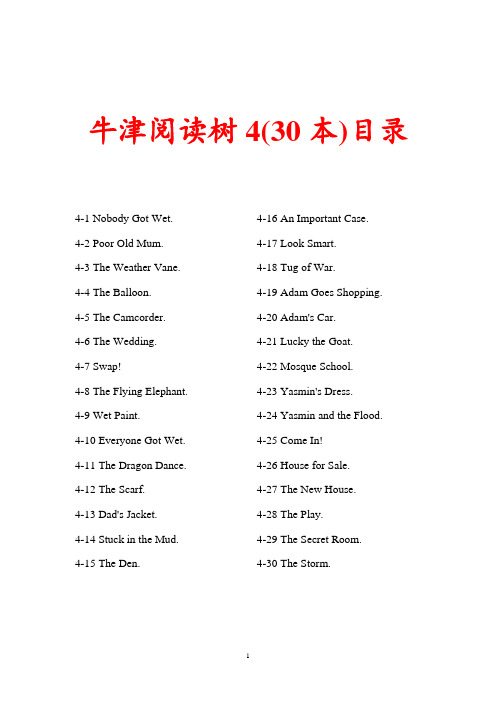
牛津阅读树4(30本)目录4-1 Nobody Got Wet.4-2 Poor Old Mum.4-3 The Weather Vane. 4-4 The Balloon.4-5 The Camcorder.4-6 The Wedding.4-7 Swap!4-8 The Flying Elephant. 4-9 Wet Paint.4-10 Everyone Got Wet. 4-11 The Dragon Dance. 4-12 The Scarf.4-13 Dad's Jacket.4-14 Stuck in the Mud. 4-15 The Den. 4-16 An Important Case.4-17 Look Smart.4-18 Tug of War.4-19 Adam Goes Shopping. 4-20 Adam's Car.4-21 Lucky the Goat.4-22 Mosque School.4-23 Yasmin's Dress.4-24 Yasmin and the Flood. 4-25 Come In!4-26 House for Sale.4-27 The New House.4-28 The Play.4-29 The Secret Room.4-30 The Storm.4-1 Nobody Got Wet.Dad got a boat.Everyone sat in the boat. Dad pushed the boat out.Oh no! Dad was stuck. Mum pulled Dad. Wilma pushed the boat.They went down the river. Nobody got wet. “What a good job!” said Mum.They had a picnic. It began to rain. But nobody got wet.The boat floated away. “Oh no!”gasped Mum. “Help me get the boat.”Mum pulled the boat in. “Don’t let me fall in,” said Mum.Mum didn’t get wet. “Nobody got wet,” said Dad. It was time to go home.Oh no! Everyone got wet!1.gasp[英] [ɡɑ:sp] vi.喘气,喘息;倒抽气;渴望vt.喘着气说出4-2 Poor Old Mum.It was sports day.Wilma was in the long jump. She came first.Wilf and Chip were in a race. They came second. “Hooray!” shouted Kipper.Dad was in the egg and spoon race. He came third. “Well done, Dad,” shouted Wilf.Mum was in a race. “Oh no!” said Wilma.Mum came last. “Poor old Mum,” said Wilf.Mum was disappointed. “What a shame!” said Dad.Dad put a blindfold on Mum. Wilf and Wilma had a surprise.“Good old Mum,” said everyone.2.long jump跳远3.shame[英] [ʃeim] n. 羞愧;羞辱;可耻的人;羞愧感4.blindfold[英] [ˈblaɪndˌfəʊld] n. 蒙眼的绷带[布等];障眼物,蒙蔽人的事物4-3 The Weather Vane.Dad went to the building site. He took Wilf and Wilma.They looked at the crane. Wilma spoke to the man in the cab.A van came to the building site. It had a weather vane on the back.Wilf looked at the weather vane. Dad had an idea.Wilf jumped over the weather vane. “Be careful,” said Dad.“Take a photograph,” said Wilma. She jumped over the weather vane.The weather vane went on the roof. Wilf took a photograph.“See the weather vane,” said Wilf. “We’ve jumped over it,” said Wilma.“What a tall story!” said Biff. But wilf had a photograph. “See,” he said.5.building site[ˈbildiŋ sait]n.建筑工地6.crane[英] [krein]n.吊车,起重机;鹤7.cab[英] [kæb] n.出租车;(公共汽车、火车等的)司机室;驾驶室;出租马车8.vane[英] [veɪn] n.叶;风向标;瞄准板;反复无常的人9.weather vane[英] [ˈweðə veɪn]n.风标4-4 The Balloon.The children were outside. A hot air balloon went by.Mrs May had a secret. She told Wilf what it was. She wanted to go in a balloon.It was time to watch television. The television went wrong. “Oh no!” said Mrs May.The photocopier went wrong. “Oh blow!” said Mrs May.The computer went wrong. “Oh bother!” said Mrs May.Wilf and Wilma came home. They had a letter. The school wanted money. Wilf had an idea.Everyone liked Wilf’s idea. “It’s a good idea!” everyone said. Everyone bought tickets.Mrs May bought lots of trickets. She wanted to go in the balloon.Mrs May won the prize. She won a ride in the balloon. “Hooray!” said Wilf.Mrs May went up in the balloon. “Hooray,” shouted everyone.“It’s wonderful,” said Mrs May.Mrs May saw the stream. She saw the houses. She looked down at the park.She took this photograph.The school made lots of money. They bought lots of things.Mrs May was pleased. She gave Wilf a present.“Thank you,” said wilf.4-5 The Camcorder.Dad bought a camcorder.The children had a race. Dad made a video. “Smile everyone,” said Dad.Dad went to the sports day. He took the camcorder. He made a video of Wilma.It was Jo’s wedding. Dad took the camcorder. He made a video of the wedding.It was Mum and Dad’s anniversary. Wilma wanted to make a video.Dad showed Wilma the camcorder. “I t’s easy,” he said.Wilma made the video. “I t’s easy,” she said. “Smile please!” said Wilf.The children watched the race. They saw the sports day.They looked at Jo’s wedding. They laughed at Wilma’s video.They went to the tree house. Wilma wanted to make a video. Dad let her use the camcorder.Wilma made the video. She saw two men. They were burglars.The burglars were running away. Wilma made a video of them.“Call the police,” she shouted.Dad got the phone. He phoned the police. Wilma got the burglars on video.The police came. They looked at the video. “Well done!” they said.The police caught the burglars. “Thanks to Wilma,” said Dad.10.camcorder[英] [ˈkæmkɔ:də] n. 摄像录像机11.tree house n. 树上小屋,巢屋12.burglar[英] [ˈbə:ɡlə] n. 窃贼;破门盗窃者;夜盗4-6 The Wedding.Jo was Mum’s sister. She was getting married.Wilma was happy. She wanted to be a bridesmaid.Wilf was unhappy. He didn’t want to be a pageboy.The grandparents came. They came for the wedding. “What a journey!” they said.Mum made Wilma’s dress. Grandmother helped.Wilf looked at the material. “Oh no!” he thought.Grandmother made the cake. Wilma put a bride and groom on it. “I t’s wonderful,” said Jo.Wilma’s dress was finished. Biff and Chip came to see it.“I like weddings,” said Chip. “I don’t,” said Wilf.Jo took Wilf’s measurements. She gave them to Mum.Wilf was unhappy. He didn’t want to be a pageboy.Mum had been shopping. She had a surprise for Wilf. “What is it?” asked Wilf.“I t’s a suit,” said Mum. “You’re not a pageboy,” said Jo. “I t was a joke,” said Grandmother.It was the day of the wedding. Dad made a video. Biff took a photograph.Wilf liked this suit. He was glad he wasn’t a pageboy. He was happy. Everyone was happy.There was a big party. Everyone danced. “I like weddings,” said Wilf.“Will you get married?” asked Wilf. “I don’t know,” said Wilma.13.bridesmaid[英] [ˈbraɪdzˌmeɪd]n.女傧相,伴娘14.pageboy[英] [ˈpeɪdʒˌbɔɪ]n.头发内卷,小听差4-7 Swap!Nadim found a bat. It was broken.Nadim mended the bat. His dad helped. The bat looked good.Chip had a robot. The robot was broken.Chip liked Nadim’s bat. He swapped the robot for the bat.Nadim mended the robot. He painted it silver. The robot looked good.Biff had a skateboard. It had no wheels. Biff swapped it for the robot.Nadim mended the skateboard. He put on new wheels. “I t’s a good skateboard now,” he said.Wilma had a bike. The bike was broken. She swapped it for the skateboard.Nadim mended the bike. He painted it black. The bike looked good.“Not bad,” said Nadim.15.bat[英] [bæt] n. 蝙蝠;短棍,(棒球等的)球棒,(网球等的)球拍16.swap[英] [swɔp] vt. 用…替换,把…换成,掉换(过来)17.skateboard[英] [ˈskeɪtˌbɔ:d, -ˌbəʊrd] n. 滑板4-8 The Flying Elephant.Mum went shopping. She took the children.The children looked up. There was an elephant on the roof.The elephant looked funny. The elephant was fat.The children laughed. “Look at that fat elephant,” they said.“An elephant?” said Mum. “Don’t be silly.”There was a storm. The wind blew. It rained and rained.It was a bad storm. The wind was strong. It blew the elephant away.The children went to school. The elephant was in the playground. The children laughed.The children told Mrs May. “Look at that fat elephant,” they said.“An elephant?” said Mrs May. “Don’t be silly.”The children liked the fat elephant. They wanted it to stay.“Sorry,” said the man. “We want it back.”“Look at the fat elephant,” said Biff. “I t’s a flat elephant now,” said Wilma.4-9 Wet Paint.Dad was painting the back door. The children were outside.Floppy wanted to come in. He jumped up. He put his paws on the paint.Dad painted the door again. Biff kicked a ball. The ball hit the door.Dad painted the door again. Kipper pushed the door. He got paint on his hands.Dad was fed up. He painted the door again. “What a job!” said Dad.Biff and Chip had a pillow fight. The pillow split open. “Oh no!” said Biff.The wind blew. It blew the feathers. “Oh no!” said Chip. “Wet paint!”There was no wet paint. The door had gone. Dad had put up an old door.The back door was inside. “I t’s safe here,” said Dad.18.split[英] [split]vt.分裂;分开;<俚>(迅速)离开;分担过去式:split 过去分词:split 4-10 Everyone Got Wet.Dad looked at the water butt. The water butt was leaking.Mum looked at the hose. The hose was leaking. “Oh bother!” said Mum.Dad mended the water butt. He put a patch on it. “What a tricky job!” he said.The water butt burst. All the water came out. Dad got wet.Mum mended the hose. She put a patch on it. “What a tricky job!” she said.Mum put the hose on the tap. The top of the tap came off. Mum got very wet.Dad got a new water butt. He put it on the bricks.He got the hose. He filled up the water butt.The water butt fell over. The water poured out. Dad got wet again.Mum got a new hose. She joined it to the old hose. She wanted to water the roses.Kipper wanted to help. He turned the tap on. Mum got wet again. “Oh no!” said Mum.The children got the paddling pool. They put it on the grass.Dad got the new hose. Biff turned on the tap.No water came out of the hose. “Funny!” said Dad. He looked down the hose.Oh no! The children got wet.19.butt[英] [bʌt] n. 烟蒂,屁股;笑柄;(武器或工具的)粗大的一端;大酒桶20.water butt n. 集雨桶,大水桶21.patch[英] [pætʃ] n. 补丁,补片;碎片,碎屑;22.tricky[英] [ˈtrɪki:] adj. 狡猾的;(形势、工作等)复杂的;机警的;微妙的23.burst[英] [bə:st] vi. 爆裂,炸破;使爆炸;充满,塞满;爆发24.tap[英] [tæp] n. 龙头,阀门;塞子;25.paddling pool[英] [ˈpædlɪŋ pu:l] n. <英>(通常在公园中供孩子们玩水的)嬉水池;4-11 The Dragon Dance.Mrs May made a dragon. The children helped her.Mrs May painted the head. The children painted the body.The dragon had a long body. The children liked the dragon.They wanted to do the dragon dance.The children got inside the body. Mrs May helped them.“It’s made of paper,” said Mrs May. “Be careful.”Anneena was inside the head. “Be careful.,” said Mrs May. “Don’t tear the paper.”The mums and dads came. The children did the dragon dance.“What a good dragon,” said everyone.Oh no! The dragon dance went wrong. The dragon tore in half.The children were upset. “Never mind,” said Mrs May. “It was only made of paper.”Anneena’s mum had an idea. She told the mums and dads. “What a good idea,” they said.The mums and dads made a dragon. They made a long body. They made a big head.The dragon looked wonderful. The children were pleased.They wanted to do the dragon dande.The children went into town. They did the dragon dance.“Come to the school fair,” said Chip.“What a lot of people,” said Mrs May. “Thanks to the dragon.”26.Anneena27.tear[英] [tiə]vt.撕裂,撕碎;划伤;夺走,扯掉;过去式:tore 过去分词:torn 4-12 The Scarf.Anneena liked knitting. She made a scarf.Anneena’s mom helped her. The scarf was long and warm. “It’s a good scarf,” said Anneena.Biff and Chip came to play. It was a cold day.Anneena put on her scarf. “What a cold day!” she said.Biff looked at Anneena’s scarf. “What a long scarf!” she said.“I made it,” said Anneena. “I couldn’t stop knitting.”The children went to the park. They went to the pond. The pond was frozen. It had ice on it.Some children ran up. They pulled Anneena’s scarf.“Stop it!” shouted Anneena. “Stop it!” shouted Anneena’s mum.A boy went on the ice. The ice was dangerous.“Get off,” shouted Anneena’s mum. “The ice is not safe.”.Anneena’s mum couldn’t get the boy. She couldn’t go on the ice.Everyone was frightened. “Help!” shouted the boy.Anneena had a good idea. She took off her scarf. “Make a rope,” she said.Anneena’s mum made a rope. She made it out of scarves and coats. She threw it to the boy.Everyone pulled the rope. They pulled the boy out of the pond.The boy was safe. “Hooray!” shouted Anneena.“I am sorry!” said the boy. “Thank you.”“I ce is dangerous,” said Anneena.Anneena looked at her scarf. “I’m glad I made it long,” she said.28.knit[英] [nit] vt.& vi. 编织,编结;接合(折骨等);4-13 Dad's Jacket.The children put some tables outside.They wanted to help children in Need. Chip made a poster. It said, “Help Children in Need”.Biff and Nadim had some plants. Kipper and Wilma had some clothes. Wilf had some books.Anneena had a good idea. She invented a game.Dad looked at Anneena’s game. “Let me have a go,” he said.A man put Dad’s jacket on. “I t’s a good fit,” he said.“It’s five pounds,” said Wilma. The man bought the jacket.Dad looked for his jacket. “Oh no!” said Wilma. “I’m sorry. A man bought it.”Dad ran after the man. “Stop!” he called. “That’s my jacket.”“No, it’s my jacket,” said the man. “Give me ten pounds for it.”“Oh no,” said Dad. He gave the man ten pounds. The man gave the jacket to Dad.The man gave Wilma ten pounds. “I t’s for Children in Need,” he said.29.poster[英] [ˈpəustə]n.海报,招贴,公告;招贴画30.have a go[英] [hæv əɡəu]企图,尝试;抱怨4-14 Stuck in the Mud.The children went for a walk. It was a muddy walk.“What a muddy path!” said Biff. “Baa! Baa!”“What was that?” asked Chip.“Baa! Baa!”“What was that?” asked Wilma.“I t’s a sheep,” said Dad. “Put Floppy on a lead.”“Oh no!” said Chip. “A sheep is stuck in the mud.”The sheep couldn’t get out. The mud was too deep.“Help me get it out,” said Dad. Dad went to help the sheep. He sank into the mud.Wilma and Chip went to help. They sank into the mud.Dad pushed. Wilma and Chip pulled. They got the sheep out. “Baa! Baa!” went the sheep.Wilma and Chip were muddy. Dad had lost a boot. Wilma went to get Dad’s boot.“Help!” said Wilma. “Now I’m stuck!”4-15 The Den.The children were by the stream. Wilf had an idea.Wilf found some sticks. “Let’s make a den,” he said. “Put the sticks like this.”They all found some sticks. Chip found lots of branches and Wilma found some straw.Biff found some logs. “We can sit on them inside the den,” she said.The children sat in the den but it began to rain.The ran splashed into the den. “I’m getting wet,” said Kipper.“We’re all getting wet,” said Dad. “It’s time to go.”“Can we come back soon?” asked Biff.It rained all week. The children couldn’t go out to play.They wanted the rain to stop. They wanted to go back to the den.The rain stopped. The children went back to the den.“Oh no!” said Wilma. “We can’t play in the den!”“Shh!” said Wilf.31.den[英] [den] n. 兽穴;贼窝;简陋污秽的小室;32.branch[英] [brɑ:ntʃ] n. 树枝;分支;部门,分科;支流33.straw[英] [strɔ:] n. 稻草;麦秆;4-16 An Important Case.The children were outside. They were playing football.Wilf kicked the ball. It landed in a bush. “Sorry,” said Wilf.Wilf couldn’t get the ball. “I can get it,” said Kipper.Kipper found a case. “Look at this,” he said. “I found it in the bush.”Dad looked at the case. He couldn’t open it.Wilf looked at the case. “What can be in it?” he asked. “I t looks important.”“What is in it?” asked Wilma. “I don’t know,” said Chip, “but it looks very important.”“What is in the case?” asked Kipper.“I don’t know,” said Biff, “but it looks very ,very important.”“What is in this case?” asked Dad.“We don’t know,” said the police office, “but it is very important.”A man came in a big car. “Who is he?” asked Kipper.“I don’t know,” said Dad, “but he looks important.”The man took the case.“I t’s my case,” he said. “Thank you. It was stolen. It is very important.”The man got in the car. ‘Excuse me,” said Wilma. “What is in the case?”“Ah!” said the man. “My sandwiches.”4-17 Look Smart.Mum had been shopping.Biff had a new dress. Chip had a shirt and Kipper had a new top.Biff looked at the dress. “Put it on,” said Mum. “I want you to look smart.”Kipper looked at the top. “Put it on,” said Mum. “I want you to look smart.”“Come here, Chip,” said Mum. “Put on this shirt.”“I know ,” said Chip. “You want me to look smart.”Dad came in with a tray. He fell over a bag. A cup fell over.Some chocolate went over Kipper’s top. “Oh no!” said Kipper. “Chocolate all over my top.”Biff sat down. She sat on Mum’s lipstick. “Oh no!” said Biff. “Lipstick on my dress.”Floppy ran in with muddy paws. He jumped up at Chip.“Oh Floppy!” said Chip, “Mud all over my shirt.“I can put on my old top,” said Kipper. “No,” said Mum. “I want you all to look smart.”“Smart clothes,” said Mum. “Put them on.” The children put them on.They set off for the party. A lorry went by. Splash!“What a good job!” said Dad. “Nobody looks smart.”34.tray[英] [trei] n.盘子;35.smart[英] [smɑ:t] adj.聪明的;敏捷的;漂亮的;整齐的4-18 Tug of War.The children went to the park. They went with Mum and Dad.They went to the stream. Chip saw a rope. It was by a tree.Dad had an idea. “We can skip,” he said. He tied the rope to the tree.Dad and the children began to skip. “Go on, jump!” said Mum. “Jump! Jump! Jump!”They all jumped. They jumped too soon. Whoops! They all fell over.Mum had an idea. “Let’s have a tug of war,” she said.Dad threw up the rope over the stream. Mum went over the bridge.The children began to pull. Mum and Dad began to pull.“Easy,” said wilf , and he let go. Mum and Dad pulled and pulled.“Easy,” said wilma, and she let go. Mum and Dad pulled and pulled.“Easy,” said Biff and Chip , and they let go. “Pull , Dad!” called Wilma.“Easy,” said Kipper. “Look at me.” He pulled Mum and Dad into the stream.“Easy,” said the man.36.tug[英] [tʌɡ]n.猛拉,推力;绳索链条;4-19 Adam Goes Shopping.Mum and Dad went shopping.They took Adam and Yasmin.Mum wanted a kettle. Adam wanted to go home.Yasmin wanted some shoes. Adam was bored.Dad wanted a track suit. Adam was fed up.Adam was tired. He went into a tent.Mum and Dad looked for Adam. They couldn’t find him.Everyone looked for Adam.Adam was fast asleep.37.kettle[英] [ˈketl] n.(烧水用的)壶;小汽锅38.track suit[英] [træk sju:t]n.径赛服4-20 Adam's Car.Adam had a new car.He saw a car on television. It looked like his car.Adam had an idea.He went to the flour bin. He put flour on the car.He dropped the car. “Oh no!” said Adam.He looked in the flour. He couldn’t find the car.The bin fell over. The flour went everywhere.Mum was cross.Adam was sorry.39.flour[英] [ˈflauə]n.面粉40.bin[英] [bin]n.箱子,容器;4-21 Lucky the Goat.Adam and yasmin went on holiday.They stayed with Grandmother.Grandmother had a party. Everyone wanted to come.Grandmother had a kid goat. The kid was called Lucky.Yasmin looked after Lucky. She gave her a bottle.She gave her a cuddle. She played with her every day.The holiday was over. Yasmin was sad.Adam had spots. They couldn’t go on the aeroplane.“Chicken pox,” said the doctor. “Come back in two weeks.”“Lucky!” said Yasmin.41.cuddle[英] [ˈkʌdl] n.搂抱,拥抱42.chickenpox[英] [ˈtʃɪkɪnpɒks]n.水痘4-22 Mosque School.Yasmin went to a mosque school.Adam wanted to go. But he was too little.He wanted to look inside.Adam couldn’t see. He climbed on the lamp post.Adam got stuck. “Oh no!” said his Mum.“Help!” called Adam. Everyone ran to help.The firemen came. They got Adam out.“You can go to mosque school,” said Grandad.“Horray!” said Adam.43.mosque[英] [mɔsk] n.清真寺,伊斯兰教寺院44.stuck[英] [stʌk] v.刺(stick 的过去式及过去分词)4-23 Yasmin's Dress.Yasmin couldn’t sleep. The rain woke her up.Yasmin went downstairs. “Oh help!” she said.Mum and Dad came downstairs. “Oh help!” said Dad.The shop was flooded. Everything was wet.“What a mess!” said Yasmin. The cloth was wet.They took the clothe outside. “Hang it up to dry,” said Yasmin.Everyone helped. The sun came out.“I t looks lovely,” said everyone. “Let’s have a party,” said Yasmin.Everyone was happy.45.flood[英] [flʌd] vi. 涌出;为水淹没4-24 Yasmin and the Flood.Yasmin had a new dress. Her mum had made it. Yasmin put it on.Yasmin looked pretty. “Wha a pretty dress!” said Dad.Yasmin went to Gran’s. “Wha a pretty dress!” said everyone.Yasmin and Adam went to play. Adam got paint on his hands.Adam got paint on Yasmin’s dress. “Oh no!” said Yasmin.Yasmin was cross. Adam was upset.Grandfather got the paint off. Everyone was happy.4-25 Come In!Dad was painting the door. Mum went out.Wilf and Wilma came to play. “Come in,” said Dad.Three children came to the house. They came to play with Biff. “Come in,” said Biff.Four children came to the house. They came to play with Chip. “Come in,” said Chip.Five children came to play. They wanted to play with Kipper. “Come in,” said Kipper.Mum came home. “What a lot of children! What a mess!” she said.Mum looked for Biff ,Chip and Kipper. They were watching television. Mum was cross.Mum gave the children some biscuits. They all went home.Mum went outside. ‘Oh no!” said Mum.4-26 House for Sale.This house was for sale.Dad liked the house. Mum liked it too.Biff and Chip looked at the house. Everyone liked it. Kipper pulled the wallpaper.They went into a room. Everyone liked this room. Kipper looked up the chimney.Biff wanted this bedroom. It was a big room. Kipper jumped on the bed.Chip wanted this bedroom. It was a big room. Kipper sat on a chair.They went down the garden. They looked at the tree house. Kipper climbed the tree.Biff and Chip climbed the tree. They went in the tree house. Kipper pulled a can down.Everyone liked the house. Floppy liked it too.46.wallpaper[英] [ˈwɔ:lˌpeɪpə]n.壁纸,墙纸4-27 The New House.A van came to the house.“What a big van!” said Chip. “What a big man!” said Kipper.The man looked at the things. “What a lot of things!” he said.Mum and Dad helped the man. They put things in the van. “What a job!” said Dad.The children helped too. Kipper put his toys in the van. Biff and Chip put the go-cart in.They put a box in the van. “What a big box!” said Biff. “What a job!” said everyone.“Goodbye,” said Biff. “Goodbye,” said Chip. “Come and play soon,” they said.The van went to the new house. Dad looked at Biff and Chip “Oh no!” said Biff and Chip.“What a job!” they said.4-28 The Play.Biff and Chip went to school. They went with Wilf and Wilma.Biff and Chip liked Mrs May. They were in her class.Wilf liked Mrs May. He was in her class too.It was story time. The story was the Wizard of Oz. It was about a girl and her dog.The girl was Dorothy. There was a storm. The wind blew the house away.Dorothy met the Scarecrow. She met the Tin Man. She met the Lion. Dorothy met a witch.There was a storm. It was playtime. The children couldn’t play outside.The children played inside. They played The Wizard of Oz. Mrs May liked the little play.Mrs May put on a play. The play was Wizard of Oz. Wilf’s mum helped Mrs May.Chip was the Tin Man. Wilf was the lion. Biff was a witch.Wilf’s dad helped Mrs May. He painted a house. The children helped him.The mums and dads came. They liked the play. “What a good play!” they said.The children liked the play. They gave Mrs May some folwers. “I t was good fun,” said Wilf.It was time to go home. There was a storm. “I t’s like the play,” said Chip.47.wizard[英] [ˈwizəd] n. (尤指故事中的)男巫;术士;<褒>有特殊才干的人,奇才adj.出色的,极好的;巫术的,巫师的adj. 出色的,极好的;巫术的,巫师的48.Dorothy[ˈdɔrəθi] n. 桃乐茜(女子名)[女子名] 多萝西Dorothea的变体;49.witch[英] [witʃ] n. 女巫,巫婆;4-29 The Secret Room.Biff and Chip liked the new house. They helped Mum and Dad.Mum put wallpaper on the wall. Chip helped her. Dad painted a door. Biff helped him.Biff was in her room. Dad looked at the wallpaper. Biff wanted new wallpaper.They went to the wallpaper shop. Biff looked at the wallpaper. She liked this wallpaper.Mum and Dad pulled the wallpaper off. Biff and Chip helped. “What a job!’ said Chip.Biff found a door. The door was stuck.Mum opened the door. She found a room. Everyone looked inside.Mum went into the secret room. She found a little house.“I t looks like our house,” said Mum.Biff opened the little house. Everyone looked inside.“I t looks like our house inside,” said Biff.Kipper found a little dog. “Look at this little dog,” said Kipper.“I t looks like our dog. It looks like Floppy.”Chip found three little children. “Look at the children,” said Chip. “They look like us.”Biff liked the bedroom. She liked the secret room too.Dad painted the secret room. Biff put things inside.Biff was in bed. She was fast asleep. She dreamed about the little children.4-30 The Storm.Wilf and Wilma came to the house. They came to play.The children went outside. They climbed the tree.They looked in the tree house. “What a mess!” said Biff.Dad helped the children. He mended the roof. Biff and Wilma mended the door.Chip and Wilf painted the tree house. Wilf painted the door. Chip painted the walls.The tree house looked good. The children put things inside.They had a party in the tree house.It was bedtime. Biff was in her room. Biff looked outside. There was a storm.It was time for school. Wilf and Wilma came. “What a storm!” said Mum.The wind blew. The rain came down. “What a storm!” said Mrs May.It was time to go home. The mums and dads came. “What a wind!” they said.“Oh no!” said Biff. The tree was down. “What a mess1” said Kipper.The children climbed on the tree. Floppy barked and barked.Floppy found something. It was a box.Everyone looked at the box. Mum opened it. They found a key inside.Chip wanted the box. He put it in his room.。
人教高中英语必修4Unit4reading(共18张PPT)PPT
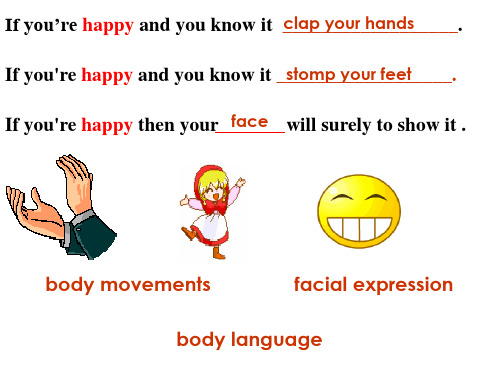
Do smiles always mean happiness ?
However, smiles around the world can be _fa_l_se_, _h_id_in_g other feelings.
summary
similar body language
Para 2
1.smile and truly happy
Para 3
Para 4
2._fr_o_w__n_in_g 3.nodding
or turning the head
one’s
_u_p__a_n_d___
_b_a_c_k__ to _d_o_w__n
uninterested or bored
Turning toward and looking at
I am _in_t_er_e_s_t_e_d_
r_o_ll_in_g eyes and I don’t b_e_li_e_v_e or I don’t turning head away like it
a_g_r_e_em__e_n_t bored
_
attitude
to show
_r_e_s_p_e_c_t_
人教高中英语必修4Unit4reading(共1 8张PPT )
人教高中英语必修4Unit4reading(共1 8张PPT )
smile
show happiness put people at ease
Page 6
Careful reading
Part II similar body language
高中英语 Unit4 reading导学案 牛津译林版选修7
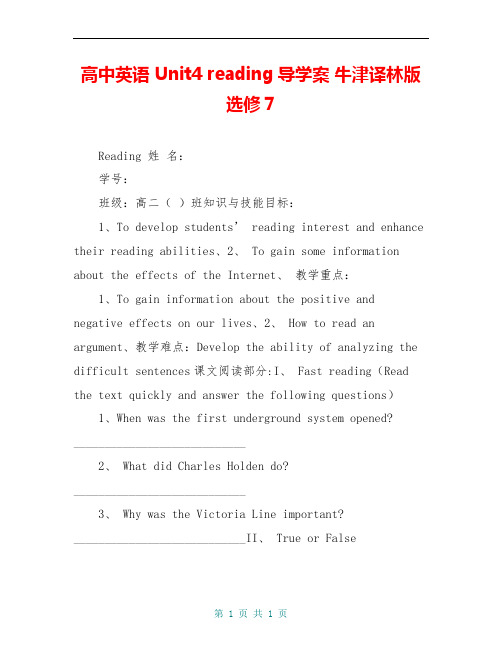
高中英语 Unit4 reading导学案牛津译林版选修7Reading 姓名:学号:班级:高二()班知识与技能目标:1、To develop students’ reading interest and enhance their reading abilities、2、 To gain some information about the effects of the Internet、教学重点:1、To gain information about the positive and negative effects on our lives、2、 How to read an argument、教学难点:Develop the ability of analyzing the difficult sentences课文阅读部分:I、 Fast reading(Read the text quickly and answer the following questions)1、When was the first underground system opened?____________________________2、 What did Charles Holden do?____________________________3、 Why was the Victoria Line important?____________________________II、 True or False1、The Metropolitan Railway Company created theCircle Line、2、 With the help of the new ways of digging tunnels, the city and South London Railway opened the first electric underground railway in1890、3、 Traveling on the six independent undergroundlines was convenient, as each line was very close to each other、4、 An American businessman set up the London Transport、5、 An architect called Charles Yerkes was responsible for designing many of the new stations between1918 and1938、 III、 Task-based reading(Read the text and fill in each blank with a proper word)TitleThe first underground in the world(1)________ for itsappearance◆Most railway tracks didn’t go into the city center、◆Horse-drawn buses, trams, cabs and carriages were used to (2)________ people to and around the city centre、◆The number of vehicles on the road (3)________ to unbelievable traffic jams and the roads became so busy that no one could travel anywhere、(4) ________ before World War IITimeEventsIn (5)________◆Deciding to build it;In1863◆Opening the initial tunnels;In1933◆(6)________ a public organization called the London Passenger Transport Board、 Unusual uses during World War IIIt (7)________ as bomb shelters, an airplane factory, and meeting rooms、(8)________ and popularity of the first underground system◆More line was added, the Victoria Line (9) ________, which was linked with other lines at almost every station、◆The last line, the Jubilee Line, was opened to (10)________ Elizabeth Ⅱ、◆The network of the system includes twelve lines and goes twenty-six miles out of the central London、IV、 Reading Comprehension1、At first the train service did not go into thecity of London because______、A、 People in the city of London could not affordit、B、 The government of London did not approve the proposal、C、 People were afraid that many historic buildings would be damaged、D、 People were afraid that the train would cause too much pollution to the town、2、 In its history, the London Underground has served as many thingsexcept_____、A、 plane factoryB、 a battlefieldC、 A meeting roomD、 a bomb shelter3、By saying “This helped make the system moreuser-friendly”, the writer means that ________A、 it is very easy for people to buy an underground ticket、B、 the Victoria line can take people to almost every stationC、 people can go to different places in the city by taking the underground、D、 the workers of the underground ticket office are friendly4、 It can be inferred from the passage that the London underground ________A、 is the best underground system in the worldB、plays a very important part in Londoner’ livesC、 is the only means of transport in central LondonD、shows the quality of Londoners’ lives、V、 Match the new words from the article with their meanings (D of p52)VI、 Study the text carefully and complete the following sentences (one word in each blank)1、伦敦地铁久负盛名,因为它是世界上最古老和最复杂的地铁系统。
初中英语九年级下册(牛津译林版)Unit4Reading教学设计
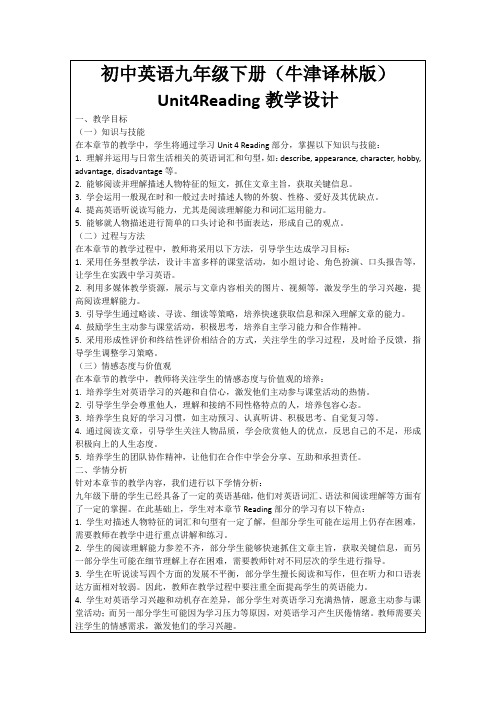
1.教师将学生分成若干小组,每组选择一个人物进行讨论,要求小组成员共同完成人物描述的任务。
2.各小组成员分工合作,收集与所讨论人物相关的信息,如外貌、性格、爱好等。
3.小组内进行讨论,运用所学词汇和句型进行人物描述,形成小组的共同成果。
4.各小组展示讨论成果,其他同学认真倾听,并给予评价和建议。
(五)总结归纳
1.教师引导学生回顾本节课所学内容,总结描述人物特征的方法和技巧。
2.学生分享在本节课中学到的知识和收获,交流学习心得。
3.教师强调本节课的重点知识,提醒学生注意在课后加强巩固。
4.布置课后作业,要求学生运用所学知识描述一个熟悉的人物,并进行同伴互评。
5.教师鼓励学生在日常生活中多观察、多描述,提高英语实际运用能力。
(3)提高学生的听说读写综合运用能力,尤其是口语表达和书面表达能力。
2.难点:
(1)如何引导学生运用一般现在时和一般过去时描述人物的外貌、性格、爱好及其优缺点。
(2)如何帮助学生在阅读过程中抓住文章主旨,进行有效的信息筛选和整合。
(3)如何激发学生的学习兴趣,提高他们的英语学习动机,使他们在课堂上积极参与各种活动。
初中英语九年级下册(牛津译林版)Unit4Reading教学设计
一、教学目标
(一)知识与技能
在本章节的教学中,学生将通过学习Unit 4 Reading部分,掌握以下知识与技能:
1.理解并运用与日常生活相关的英语词汇和句型,如:describe, appearance, character, hobby, advantage, disadvantage等。
5.教师对每个小组的表现进行点评,指出优点和不足,指导学生进一步提高。
(四)课堂练习
必修四unit4-Reading[思维导图知识点知识树复习资料]人教版高中英语
![必修四unit4-Reading[思维导图知识点知识树复习资料]人教版高中英语](https://img.taocdn.com/s3/m/60a5df1ddd88d0d233d46add.png)
◆Body language goes with
no words .
◆ Body language is actions that can communicate ideas without use of words.
Read one’s mind( 察言观色)
6. Men from all Muslin countries will not shake hands with women.F
7. From the passage we can see western cultures are better than eastern cultures. F
gesture
posture
eye contact
facial expression
What are the following facial expressihappy
surprise
angry
fear
What do people in different countries usually do when meeting?
Coulon from France twice on
knows
each cheek
What do people in different countries usually do when meeting?
countries Ways to greet each other
Columbia
Japan canada
they talk
Answer the questions.
1. Why are the international students coming to China?
英语泛读教程第4册unit1共23页

★Method to be applied: ●Elicitation and guiding (The teacher should encourage volunteers and meanwhile call on those inactive ones to participate in the discussion);
3. Discussion of Key Words and Phrases
(1) come upon—(in the text) to meet by chance Other usages:
① The enemy came upon us only to be entrapped and wiped out.
Leo Tolstoy (1828-1910)
•
War and Peace
•
Anna Karenina
Mark Twain (1835-1910)
•
Adventures of Tom Sawyer
•
The Adventure of Huckleberry Finn
William Shakespeare (1564-1616)
2. Discussion of the text: ( On the precondition that all the students have previewed the text carefully beforehand. )
Pictures of some writers
高中英语必修四unit4Reading

Unit 4 Reading Communication: No problem?
Brainstorming
1. What is the purpose of language? The purpose of language is to communicate with other people.
1. Englishmen often stand close to others or touch strangers as soon as they meet. F
2. Most people around the world F now greet each other by kissing.
George Cook (Canada)
Julia Smith (Britain)
Tony Garcia (Columbia)
First-reading
I. While reading, please try to divide the whole passage into several parts and find out the main idea. Part 1. (Para. 1) Meet the visitors at the airport.
Part 4. (Para. 5) Summary of body language.
II. How do different international students behave when they greet people? Complete the chart with information from the passage.
3. There are many different ways to greet someone using words. How many ways can you think of to greet someone if you cannot speak?
人教高中英语必修4Unit4reading(共20张PPT)

1
2
Tony
Julia
Akira
George
Aziz
writer
3
Tony
Coulon
4
Greeting 1
Tony Julia
approached touched kissed
stepped surprised hands in defence
Columbia & Britain misunderstanding
Summary
Columbia & Britain Japan & Canada Jordan & China
France & Colombia
Body languages differ from country
to country.
"Some body languages are good, while some are bad."
?
ቤተ መጻሕፍቲ ባይዱ
When in Rome, do as Romans do.
A. Write a short passage about your understanding of Body Language.
B. Do more detailed reading after class.
1、只要有坚强的意志力,就自然而然地会有能耐、机灵和知识。2、你们应该培养对自己,对自己的力量的信心,百这种信心是靠克服障碍,培养意志和锻炼意志而获得的。 3、坚强的信念能赢得强者的心,并使他们变得更坚强。4、天行健,君子以自强不息。5、有百折不挠的信念的所支持的人的意志,比那些似乎是无敌的物质力量有更强大 的威力。6、永远没有人力可以击退一个坚决强毅的希望。7、意大利有一句谚语:对一个歌手的要求,首先是嗓子、嗓子和嗓子……我现在按照这一公式拙劣地摹仿为:对 一个要成为不负于高尔基所声称的那种“人”的要求,首先是意志、意志和意志。8、执着追求并从中得到最大快乐的人,才是成功者。9、三军可夺帅也,匹夫不可夺志也。 10、发现者,尤其是一个初出茅庐的年轻发现者,需要勇气才能无视他人的冷漠和怀疑,才能坚持自己发现的意志,并把研究继续下去。11、我的本质不是我的意志的结果, 相反,我的意志是我的本质的结果,因为我先有存在,后有意志,存在可以没有意志,但是没有存在就没有意志。12、公共的利益,人类的福利,可以使可憎的工作变为可 贵,只有开明人士才能知道克服困难所需要的热忱。13、立志用功如种树然,方其根芽,犹未有干;及其有干,尚未有枝;枝而后叶,叶而后花。14、意志的出现不是对愿 望的否定,而是把愿望合并和提升到一个更高的意识水平上。15、无论是美女的歌声,还是鬓狗的狂吠,无论是鳄鱼的眼泪,还是恶狼的嚎叫,都不会使我动摇。16、即使 遇到了不幸的灾难,已经开始了的事情决不放弃。17、最可怕的敌人,就是没有坚强的信念。18、既然我已经踏上这条道路,那么,任何东西都不应妨碍我沿着这条路走下 去。19、意志若是屈从,不论程度如何,它都帮助了暴力。20、有了坚定的意志,就等于给双脚添了一对翅膀。21、意志坚强,就会战胜恶运。22、只有刚强的人,才有神 圣的意志,凡是战斗的人,才能取得胜利。23、卓越的人的一大优点是:在不利和艰难的遭遇里百折不挠。24、疼痛的强度,同自然赋于人类的意志和刚度成正比。25、能 够岿然不动,坚持正见,度过难关的人是不多的。26、钢是在烈火和急剧冷却里锻炼出来的,所以才能坚硬和什么也不怕。我们的一代也是这样的在斗争中和可怕的考验中 锻炼出来的,学习了不在生活面前屈服。27、只要持续地努力,不懈地奋斗,就没有征服不了的东西。28、立志不坚,终不济事。29、功崇惟志,业广惟勤。30、一个崇高 的目标,只要不渝地追求,就会居为壮举;在它纯洁的目光里,一切美德必将胜利。31、书不记,熟读可记;义不精,细思可精;惟有志不立,直是无着力处。32、您得相 信,有志者事竟成。古人告诫说:“天国是努力进入的”。只有当勉为其难地一步步向它走去的时候,才必须勉为其难地一步步走下去,才必须勉为其难地去达到它。33、 告诉你使我达到目标的奥秘吧,我唯一的力量就是我的坚持精神。34、成大事不在于力量的大小,而在于能坚持多久。35、一个人所能做的就是做出好榜样,要有勇气在风 言风语的社会中坚定地高举伦理的信念。36、即使在把眼睛盯着大地的时候,那超群的目光仍然保持着凝视太阳的能力。37、你既然期望辉煌伟大的一生,那么就应该从今 天起,以毫不动摇的决心和坚定不移的信念,凭自己的智慧和毅力,去创造你和人类的快乐。38、一个有决心的人,将会找到他的道路。39、在希望与失望的决斗中,如果 你用勇气与坚决的双手紧握着,胜利必属于希望。40、富贵不能淫,贫贱不能移,威武不能屈。41、生活的道路一旦选定,就要勇敢地走到底,决不回头。42、生命里最重 要的事情是要有个远大的目标,并借助才能与坚持来完成它。43、事业常成于坚忍,毁于急躁。我在沙漠中曾亲眼看见,匆忙的旅人落在从容的后边;疾驰的骏马落在后头, 缓步的骆驼继续向前。44、有志者事竟成。45、穷且益坚,不坠青云之志。46、意志目标不在自然中存在,而在生命中蕴藏。47、坚持意志伟大的事业需要始终不渝的精神。 48、思想的形成,首先是意志的形成。49、谁有历经千辛万苦的意志,谁就能达到任何目的。50、不作什么决定的意志不是现实的意志;无性格的人从来不做出决定。我终 生的等待,换不来你刹那的凝眸。最美的不是下雨天,是曾与你躲过雨的屋檐。征服畏惧、建立自信的最快最确实的方法,就是去做你害怕的事,直到你获得成功的经验。 真正的爱,应该超越生命的长度、心灵的宽度、灵魂的深度。生活真象这杯浓酒,不经三番五次的提炼呵,就不会这样可口!人格的完善是本,财富的确立是末能力可以慢 慢锻炼,经验可以慢慢积累,热情不可以没有。不管什么东西,总是觉得,别人的比自己的好!只有经历过地狱般的折磨,才有征服天堂的力量。只有流过血的手指才能弹 出世间的绝唱。对时间的价值没有没有深切认识的人,决不会坚韧勤勉。第一个青春是上帝给的;第二个的青春是靠自己努力的。不要因为寂寞而恋爱,孤独是为了幸福而 等待。每天清晨,当我睁开眼睛,我告诉自己:我今天快乐或是不快乐,并非由我所遭遇的事情造成的,而应该取决于我自己。我可以自己选择事情的发展方向。昨日已逝,
人教版高中英语必修四unit4 reading (共32张PPT)
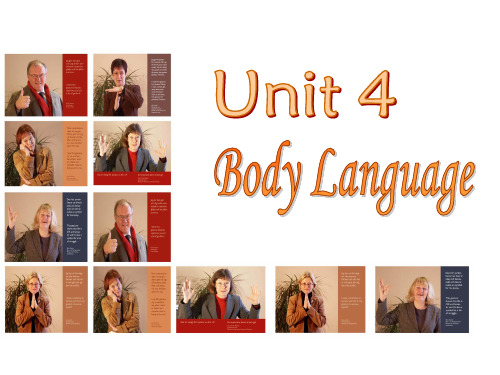
When in Rome, do as Romans do. (入乡随俗)
In Japan, people prefer to …People in Colombia like… English people do not usually…The French custom is … Men from Jordan will often… …
Wish you a good journey!
Yours, …
1 Learn the new words by heart
She _s_t_ep__p_ed__b_a_c_k___ appearing _s_u_r_p_r_is_e_d_ and put up her hands, as if _i_n_d_e_f_e_n_c_e_.
George Cook The second (Canada) mistake
Akira Nagata (Japanese)
C
international students.
Detailed reading : Para1
When: ___y_e_s_t_e_r_d_a_y_______________ Who: ___a_n_o_t_h_e_r__s_tu__d_e_n_t_a_n__d_I_,_______ ______________________________________ Where: t_h_e__C_a_p_i_t_a_l_In__te_r_n_a__ti_o_n_a_l_A__ir_p_o__rt__ What to do: __T_o__m__e_e_t___________________ ____th__is__y_e_a_r_’_s_i_n_t_e_r_n_a_t_io_n__a_l _s_t_u_d_e_n_t_s_.____ _______________________________________
初中英语七年级上册(牛津译林版)Unit4Reading教学设计
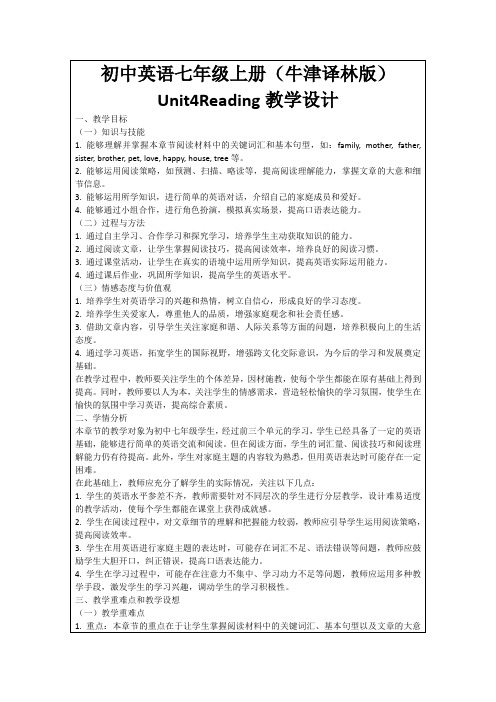
(二)讲授新知
1.教学内容:本节课主要学习Unit 4 Reading部分,介绍一个家庭的成员、爱好和日常生活。
2.教学步骤:
(1)教师带领学生一起阅读文章,指导学生运用阅读策略,如预测、扫描、略读等,获取关键信息。
2.教学目的:巩固学生对文章内容的理解,提高学生的英语运用能力。
3.教学实施:教师发放练习题,学生独立完成,然后教师进行讲解和反馈。
(五)总结归纳
1.教学内容:教师引导学生回顾本节课所学内容,总结家庭成员、爱好和日常生活的相关表达。
2.教学目的:帮助学生巩固所学知识,提高学生的归纳总结能力。
3.教学实施:教师引导学生进行总结,鼓励学生用英语表达自己的观点,教师适时给予补充和纠正。
四、教学内容与过程
(一)导入新课
1.教学活动设计:教师展示一幅关于家庭的图片,引导学生关注家庭成员和爱好。然后,教师提问:“Can you introduce your family and hobbies?”,让学生尝试用英语介绍自己的家庭成员和爱好。
2.教学目的:激发学生的兴趣,调动学生的积极性,为新课的学习做好铺垫。
五、作业布置
1.书面作业:
(1)根据本节课所学内容,编写一段关于自己家庭的英语介绍,包括家庭成员、爱好和日常生活。
(2)完成课后练习册中的相关习题,巩固文章内容和词汇。
(3)预习下一节课的内容,提前了解相关话题,为课堂学习做好准备。
2.口语作业:
(1)与同学进行英语对话,互相介绍家庭成员和爱好,提高口语表达能力。
在教学过程中,教师要关注学生的个体差异,因材施教,使每个学生都能在原有基础上得到提高。同时,教师要以人为本,关注学生的情感需求,营造轻松愉快的学习氛围,使学生在愉快的氛围中学习英语,提高综合素质。
- 1、下载文档前请自行甄别文档内容的完整性,平台不提供额外的编辑、内容补充、找答案等附加服务。
- 2、"仅部分预览"的文档,不可在线预览部分如存在完整性等问题,可反馈申请退款(可完整预览的文档不适用该条件!)。
- 3、如文档侵犯您的权益,请联系客服反馈,我们会尽快为您处理(人工客服工作时间:9:00-18:30)。
兴化文正实验学校问题工具单八年级英语组设计
8A Uint 4 Reading Friends 问题导读—评价单
设计人:林红娟审核人:序号:2-1 班级组名姓名时间:年月日
【学习目标】
1.掌握本课的新单词及一些词组。
2.能熟练,流利的朗读课文。
3. 学习生活中的DIY。
【重点难点】
1.理解文章的大意,掌握语言知识。
2.学习阅读的技巧,如通过文章语境,推测新词的意思。
【预习评价】
Question 1
Read and recite the new words on page 44. 、
Question 2
翻译下列短语,并在课文中画出:
1、痴迷于
2、装饰房间
3、看起来可怕
4、犯错误
5、把图画张贴在墙上
6、用…….注满
7、把它涂成蓝色 8、继续油漆
9、not only…but also 10.advise him to take a course in DIY 11.made him angry 12.I know much more about DIY than my cousin
Question 3
Read the text loudly 6 times and finish part B1 –B4.
【我的问题】
1.
2.
【多元评价】
_______________________________________________________________________ Where there is a will, there is a way. 八年级英语问题导读—评价单。
